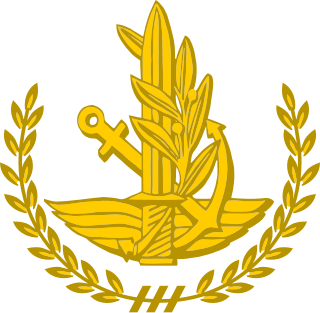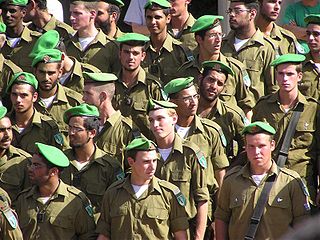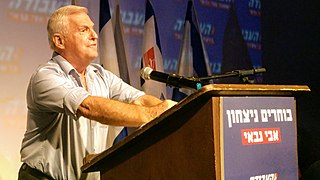
The 1948 Arab–Israeli War, also known as the First Arab–Israeli War, followed the civil war in Mandatory Palestine as the second and final stage of the 1948 Palestine war. It formally began following the end of the British Mandate for Palestine at midnight on 14 May 1948; the Israeli Declaration of Independence had been issued earlier that day, and a military coalition of Arab states entered the territory of Mandatory Palestine in the morning of 15 May.

The Israel Defense Forces, alternatively referred to by the Hebrew-language acronym Tzahal (צה״ל), is the national military of the State of Israel. It consists of three service branches: the Israeli Ground Forces, the Israeli Air Force, and the Israeli Navy. It is the sole military wing of the Israeli security apparatus. The IDF is headed by the Chief of the General Staff, who is subordinate to the Israeli Defense Minister.

Benny Morris is an Israeli historian. He was a professor of history in the Middle East Studies department of Ben-Gurion University of the Negev in the city of Beersheba, Israel. Morris was initially associated with the group of Israeli historians known as the "New Historians", a term he coined to describe himself and historians Avi Shlaim, Ilan Pappé and Simha Flapan. Scholars have perceived an ideological shift in Morris's work and a departure from the critical scholarship of his New Historian colleagues starting around 2000 during the Second Intifada.
Citizens of Israel have refused to serve in the Israel Defense Forces (IDF) or have disobeyed orders on the grounds of pacifism, antimilitarism, religious philosophy, or political disagreement with Israeli policy such as its occupation of the West Bank. Conscientious objectors in Israel are known as sarvanim which is sometimes translated as "refuseniks", or mishtamtim.

Rafael "Raful" Eitan was an Israeli general, former Chief of Staff of the Israel Defense Forces (Ramatkal) and later a politician, a Knesset member, and government minister.
The code of purity of arms is one of the values stated in the Israel Defense Forces' official doctrine of ethics, The Spirit of the IDF. It states that:
The soldier shall make use of his weaponry and power only for the fulfillment of the mission and solely to the extent required; he will maintain his humanity even in combat. The soldier shall not employ his weaponry and power in order to harm non-combatants or prisoners of war, and shall do all he can to avoid harming their lives, body, honor and property.
The Agranat Commission was a National Commission of Inquiry set up to investigate failings in the Israel Defense Forces in the prelude to the Yom Kippur War, when Israel was found unprepared for the Egyptian attack against the Bar Lev Line and a simultaneous attack by Syria in the Golan—the first phase in a war in which 2,812 Israeli soldiers were killed.

Hesder is an Israeli yeshiva program which combines advanced Talmudic studies with military service in the Israel Defense Forces, usually within a Religious Zionist framework. The program allows Orthodox Jewish men to serve in the Israeli military while still engaging in Torah study.

Aluf is a senior military rank in the Israel Defence Forces (IDF) for officers who in other countries would have the rank of general, air marshal, or admiral. In addition to the aluf rank, four other ranks are derivatives of the word, together, constituting the five highest ranks in the IDF.

The Chief of the General Staff, also known as the Commander-in-Chief of the Israel Defense Forces, is the professional head of the Israel Defense Forces (IDF). The current Chief of the General Staff is Herzi Halevi.

The Dahiya doctrine, or Dahya doctrine, is a military strategy involving the destruction of civilian infrastructure in order to pressure hostile regimes. It is a type of asymmetric warfare. It endorses the employment of "disproportionate force" to secure that end. The doctrine was outlined by former Israel Defense Forces (IDF) Chief of General Staff Gadi Eizenkot.

In 1948, more than 700000 Palestinian Arabs – about half of prewar Mandatory Palestine's Arab population – fled from their homes or were expelled by Zionist militias and, later, the Israeli army during the 1948 Palestine war, following the Partition Plan for Palestine. The expulsion and flight was a central component of the fracturing, dispossession, and displacement of Palestinian society, known as the Nakba. Dozens of massacres were conducted by Israeli military forces and between 400 and 600 Palestinian villages were destroyed. Village wells were poisoned in a biological warfare programme and properties were looted to prevent Palestinian refugees from returning. Other sites were subject to Hebraization of Palestinian place names. These activities were not necessarily limited to the year 1948.
The Rotem Crisis was a confrontation between Israel and the United Arab Republic (UAR) in February–March 1960. Prompted by tensions along the Israeli–Syrian border, Egypt deployed its armed forces on Israel's largely undefended southern front, catching Israel off guard. Although hostilities did not break out, the crisis influenced events leading up to the 1967 Six-Day War.

The People's Army Model is a school of thought in Israel concerning the role of the Israeli Army, the IDF, vis-à-vis Israeli society. According to this conception, the IDF plays a broader role than merely defending Israel's national security. Israel's regular army is relatively small, and thus its strength in emergency is based on reservists, which comprise much of the entire nation. Following the Suez Crisis, the Israeli newspaper Davar published the following: "Our army is, as is well known, the people's army, an army of reserves, the laborer and the clerk, [as] the laborer and the teacher had one day laid down their daily work and stabilized the flag".

The Israeli occupation of Southern Lebanon formally began in 1985 and ended in 2000 as part of the South Lebanon conflict. In 1982, Israel invaded Lebanon in response to a spate of attacks carried out from Lebanese territory by Palestinian militants, triggering the 1982 Lebanon War. The Israel Defense Forces (IDF) and allied Christian Lebanese militias subsequently seized large parts of Lebanon, including the capital city of Beirut, amid the hostilities of the wider Lebanese Civil War. Israel later withdrew from most of the occupied territory between 1983 and 1985, but retained control over areas along the Israel–Lebanon border that would later comprise the Israeli "Security Zone" in coordination with the separatist State of Free Lebanon, which collapsed in 1984. From 1985 onwards, Israel supported the South Lebanon Army (SLA), the Lebanese Christian quasi-military of the collapsed Free Lebanon State, against Hezbollah and other Muslim militants in most of Southern Lebanon; Israel's overall stated purpose for the Security Zone was to create a buffer separating Israeli civilians in northern border towns from Lebanon-based terrorists. In 1993, it was estimated that there were 1,000–2,000 Israeli troops and 2,300 SLA troops active in the area.
B'Tselem is a Jerusalem-based non-profit organization whose stated goals are to document human rights violations in the Israeli-occupied Palestinian territories, combat any denial of the existence of such violations, and help to create a human rights culture in Israel. It is currently headed by Yuli Novak, who took over in June 2023 from Hagai El-Ad, who had served as its director-general since May 2014. B'Tselem also maintains a presence in Washington, D.C., where it is known as B'Tselem USA. The organization has provoked sharp reactions within Israel, ranging from harsh criticism to strong praise.

The 1948 Palestine war was fought in the territory of what had been, at the start of the war, British-ruled Mandatory Palestine. It was the first war of the Israeli–Palestinian conflict and the broader Arab–Israeli conflict. During the war, the British withdrew from the territory and the State of Israel was established, leading to it being known in Israel as the War of Independence.

Amiram Levin is a retired Aluf of the Israel Defense Forces.

The Israeli Ground Forces are the ground forces of the Israel Defense Forces (IDF). The commander is the General Officer Commanding with the rank of Major General, the Mazi, subordinate to the Chief of General Staff.
Dr. Haim Bresheeth-Žabner is an Israeli filmmaker, photographer, academic, and activist known for his critical work in film studies, media analysis, and his activism focusing on Israeli policies towards Palestinians, cultural studies, and the study of the Middle East conflict. He is known for being a critic of Israel and being opposed to the idea of zionism.














